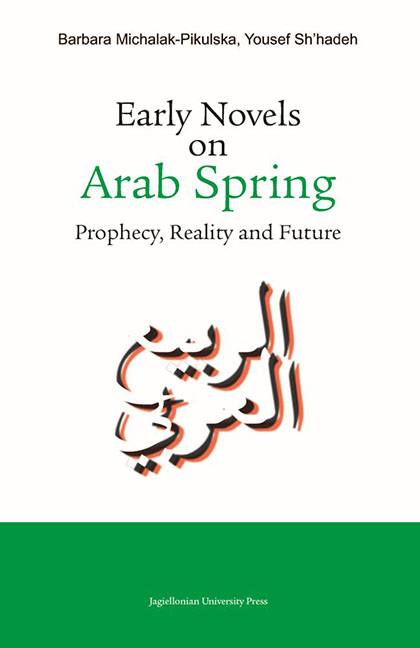Book contents
- Frontmatter
- Contents
- Introduction
- Part I Awakening of the Awareness of Subjugation – The Prophecy of the Spring of Nations in Arab Novels
- Part II At the Heart of the Arab Spring Events
- Part III The Future: The Spring Continues
- 17 Mu‘Taṣim Aš - Šā‘Ir : Uhzūǧat ar-raḥīl (A Song of Departure) and Fī intiẓār as-sulaḥfāt (Waiting for a Turtle)
- 18 Aḥmad ‘Abd Al - Malik : Al-Aqni‘a (Masks)
- 19 Ṭayba Aš - Šarīf Al - Idrīsī : Ḥaǧar min saqar (A Stone from Hell)
- 20 Amīra Aš - Širbīnī : ‘Itq (Liberation)
- 21 ‘ Izz Ad - Dīn Šukrī Fašīr : Bāb al-ẖurūǧ – risālat ‘Alī al-muf‘ama bi-bahǧa ġayr mutawaqqa‘a (The Gate to Leave – Ali’s Letter Filled with Unexpected Joy)
- Conclusion
- Bibliography
- Summary in Arabic
2 - Nabīl al - Mulḥim : Sarīr Baqlāwa al-ḥazīn (Baklava’s Sad Bed)
Published online by Cambridge University Press: 13 October 2023
- Frontmatter
- Contents
- Introduction
- Part I Awakening of the Awareness of Subjugation – The Prophecy of the Spring of Nations in Arab Novels
- Part II At the Heart of the Arab Spring Events
- Part III The Future: The Spring Continues
- 17 Mu‘Taṣim Aš - Šā‘Ir : Uhzūǧat ar-raḥīl (A Song of Departure) and Fī intiẓār as-sulaḥfāt (Waiting for a Turtle)
- 18 Aḥmad ‘Abd Al - Malik : Al-Aqni‘a (Masks)
- 19 Ṭayba Aš - Šarīf Al - Idrīsī : Ḥaǧar min saqar (A Stone from Hell)
- 20 Amīra Aš - Širbīnī : ‘Itq (Liberation)
- 21 ‘ Izz Ad - Dīn Šukrī Fašīr : Bāb al-ẖurūǧ – risālat ‘Alī al-muf‘ama bi-bahǧa ġayr mutawaqqa‘a (The Gate to Leave – Ali’s Letter Filled with Unexpected Joy)
- Conclusion
- Bibliography
- Summary in Arabic
Summary
The world has been going on similarly for a long time: violence, killing, slave exploitation, and at the same time care for the appearance of humanism. The author of the novel believed that his work should bear witness to the truth and consolidate his experiences in literary form. The novel is about a desert prison in Palmyra. This type of prose is referred to as adab as-suǧūn (prison literature). The work is autobiographical because the author – a former prisoner who experienced torture, describes what really happened in this terrible prison in the 1980s and 1990s. Baklava’s Sad Bed explores the psychological sphere of both sides – prisoners and torturers. It shows indifference to the harm befalling other people, as imprisoned individuals are deprived of their right to life and dignity in the novel, and that it is common to accept torture and death itself. A man in prison is just one of many who make up a great mass – degraded, objectified and deprived of dignity, prisoners accepted their fate in order to preserve their lives. Finally, the novel shows the enormity of corruption among Syrian officials and officers.
The main character, dr Nizār, belongs to the Arab Ba‘ath Party and is a well-known poet who tackles the issues of homeland and patriotism. Despite this, he was imprisoned and treated cruelly because he learned, while working as a doctor in a prison hospital, how ruthlessly the authorities treat their opponents – resorting to criminal acts was not beyond them. Dr Nizār is arrested because he is suspected of espionage, cooperation with hostile forces and of providing information on the state of prisoners. The man is subjected to torture that finally leads to his death.
The overall story consists of more or less detailed descriptions, but always reliably outlined images and characters. The most important of them are: the head of the prison, Colonel Ṣalāḥ, and the cruel corporal Rabāb, representing various forms of brutality, especially torture that appeals to the reader’s imagination, aimed at the total destruction of prisoners. He did not dwell on the feelings and dignity of the prisoners, but tortured them without restraint.
- Type
- Chapter
- Information
- Early Novels on Arab SpringProphecy, Reality and Future, pp. 15 - 16Publisher: Jagiellonian University PressPrint publication year: 2022

